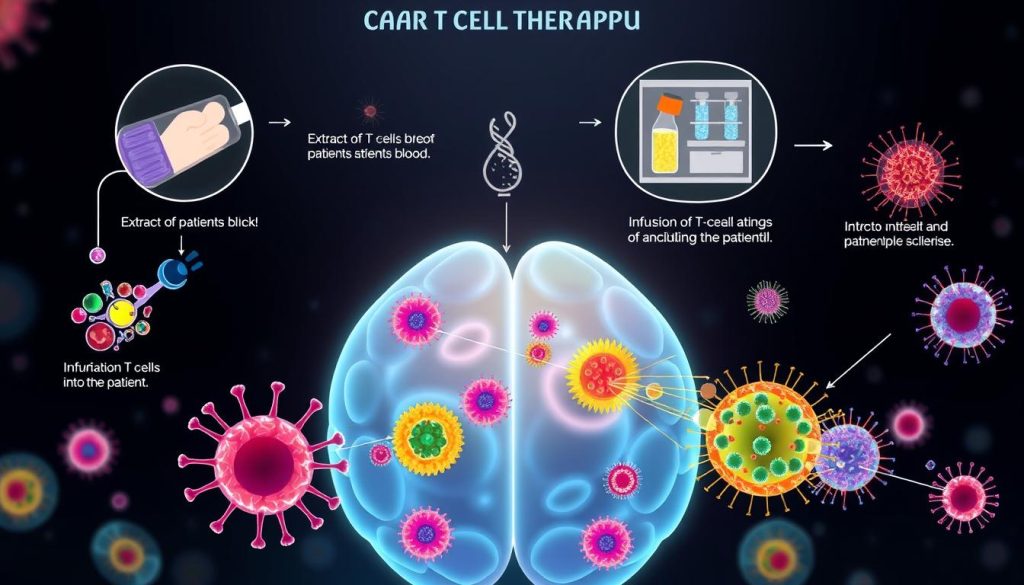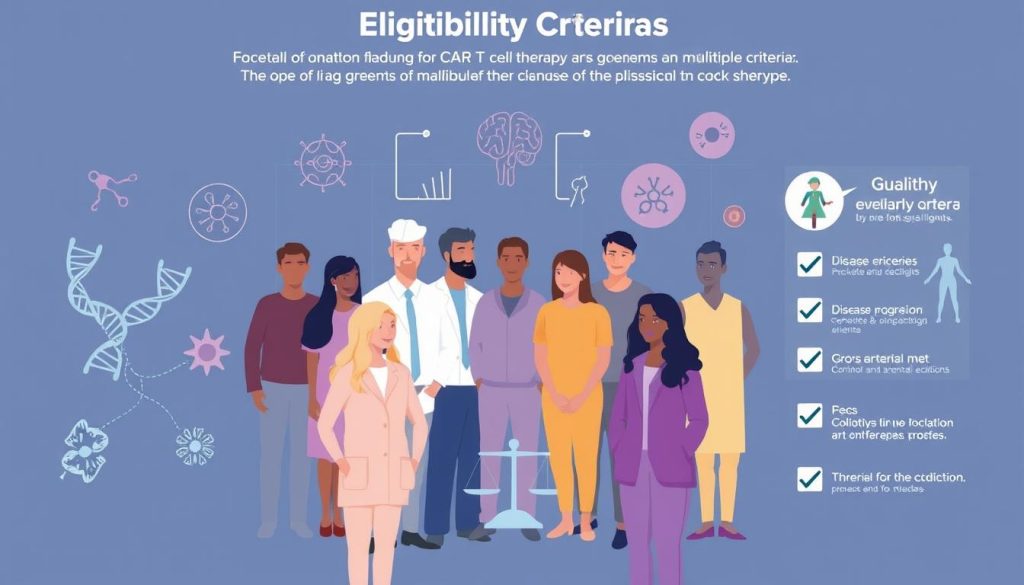Researchers are looking for new ways to treat multiple sclerosis (MS), an autoimmune disease. They are exploring CAR T cell therapy, which has worked well against some cancers. This therapy might be a breakthrough for MS patients. CAR T cell therapy modifies a patient’s immune cells to fight the wrong targets in MS. This approach uses the body’s defenses to control the disease. It could lead to better long-term management and quality of life for MS patients.
This article explains the science behind CAR T cell therapy for MS. We’ll look at its benefits, how it compares to current treatments, and the challenges ahead. It’s a promising field that could change the lives of those with MS.
Understanding Multiple Sclerosis
Multiple sclerosis (MS) is a chronic autoimmune disorder that affects the central nervous system. It causes a wide range of symptoms and challenges for those diagnosed. To manage MS well, it’s important to know its symptoms, diagnosis, causes, and risk factors.
Symptoms and Diagnosis
The multiple sclerosis symptoms vary from person to person. They can include:
- Fatigue
- Numbness or tingling sensations
- Weakness
- Vision problems
- Difficulty with balance and coordination
- Cognitive issues, such as memory and concentration difficulties
Because of the wide range of symptoms, ms diagnosis can be hard. Doctors use neurological exams, MRI scans, and other tests to confirm MS. Early diagnosis is key for timely treatment and management.
Causes and Risk Factors
The exact ms causes are not fully understood. Researchers think genetics and environment play a role. Some known risk factors for ms include:
- Family history of MS
- Vitamin D deficiency
- Smoking
- Exposure to certain viruses, such as Epstein-Barr virus
- Living in regions farther from the equator
“MS is a complex disease that requires a complete approach to diagnosis, treatment, and management. By understanding symptoms, causes, and risk factors, individuals can work with their healthcare team to create a personalized plan for living well with MS.” – Dr. Sarah Johnson, Neurologist
Knowing the signs and symptoms of MS and the risk factors can help individuals seek timely medical attention and support. With ongoing research and new treatments, there’s hope for a better quality of life for those with multiple sclerosis.
Current Treatment Options for Multiple Sclerosis
There’s no cure for multiple sclerosis (MS), but many treatments can help. These multiple sclerosis treatment options include medicines, therapies, and lifestyle changes. They aim to manage symptoms, slow the disease, and improve life quality.
Medications and Disease-Modifying Therapies
Many ms medications are used to treat relapses and manage symptoms. Some common ones are:
- Corticosteroids: They reduce inflammation and shorten relapses.
- Interferon beta and glatiramer acetate: Disease-modifying therapies for ms that lessen relapse frequency and severity.
- Oral medications: Such as fingolimod, dimethyl fumarate, and teriflunomide, which reduce relapse rates and slow disability.
- Monoclonal antibodies: Like natalizumab and ocrelizumab, which target specific immune cells involved in MS.
These medicines work differently for everyone. The right treatment depends on the disease’s severity, how often you have relapses, and what you prefer.
Rehabilitation and Lifestyle Changes
MS rehabilitation is key in managing symptoms and keeping abilities. Important parts of rehab include:
| Rehabilitation Type | Benefits |
|---|---|
| Physical therapy | Improves mobility, balance, and strength |
| Occupational therapy | Enhances daily living skills and adaptations |
| Speech therapy | Addresses communication and swallowing difficulties |
| Cognitive rehabilitation | Helps manage cognitive symptoms like memory and attention issues |
Along with rehab, making lifestyle changes can also help. These include:
- Maintaining a healthy diet
- Regular exercise
- Stress management techniques
- Adequate sleep
- Avoiding extreme temperatures

While current treatments can manage MS symptoms and slow disease progression, more effective therapies are needed.
New treatments, like CAR T cell therapy, offer hope for better outcomes and quality of life for those with MS.
Introduction to CAR T Cell Therapy
In recent years, cellular immunotherapy has become a promising way to treat diseases like cancer and autoimmune disorders. CAR T cell therapy is a groundbreaking treatment. It uses a patient’s own immune system to fight disease.
CAR T cell therapy changes a patient’s T cells to have special receptors. These receptors help the T cells find and destroy cancer cells or other harmful cells.
To make CAR T cells, several steps are taken:
- Collecting a sample of the patient’s blood, which contains T cells
- Isolating the T cells from the blood sample
- Genetically engineering the T cells to express the desired CARs
- Expanding the modified T cells in the laboratory to create a large population
- Infusing the CAR T cells back into the patient’s bloodstream
After being infused, the CAR T cells multiply and start looking for and killing the targeted cells. This method could be more effective and less harmful than traditional treatments like chemotherapy or radiation.
“CAR T cell therapy represents a major step forward in the field of personalized medicine, promising hope to patients with hard-to-treat conditions.”
While CAR T cell therapy has worked well for some blood cancers, researchers are looking into using it for other diseases, including multiple sclerosis. It could target the immune cells that harm the myelin sheath in MS. This could stop the disease from getting worse and even help repair the damage.
How CAR T Cell Therapy Works
CAR T cell therapy is a new way to fight cancer. It uses the body’s immune system to attack cancer cells. This method changes T cells to find and destroy cancer cells.
First, doctors take a blood sample from the patient. They then pick out the T cells. These T cells are changed to have a special receptor that finds cancer cells.

Targeting Specific Antigens
This therapy is great because it targets specific cancer markers. By picking the right marker, the therapy is very precise. This makes it safer and more effective.
Infusion and Monitoring
After the T cells are changed, they are put back into the patient. They look for and find cancer cells. When they do, they kill the cancer cells.
After the treatment, patients are watched closely. This is to see how well the treatment worked and to check for side effects. The T cells can stay in the body for a long time, helping to prevent cancer from coming back.
CAR T Cell Therapy for Multiple Sclerosis
CAR T cell therapy is a new way to treat cancer and might help with multiple sclerosis (MS) too. It changes a patient’s immune cells to fight off the bad cells causing MS. This could slow down or even stop MS damage.
Researchers use car t cell therapy to fix the immune system. They start by taking T cells from the patient. Then, they make these cells special in a lab to find and kill MS-causing cells.
After the special T cells are put back in the patient, they find and kill the bad cells. This helps protect the nerve fibers in the brain and spinal cord. It’s a way to stop MS from getting worse and help the body fix damaged areas.
This therapy is special because it’s made just for the patient. It uses the patient’s own cells, so it’s less likely to be rejected. Early tests look promising, and now it’s being tested in real-world trials.
| Treatment Approach | Target | Potential Benefits |
|---|---|---|
| CAR T Cell Therapy | Autoreactive Immune Cells | Halting Disease Progression |
| Immune System Modulation | Restoring Balance | Promoting Remyelination |
| Autologous Cell Transplantation | Personalized Treatment | Minimizing Rejection Risk |
Even though CAR T cell therapy is promising, it’s just starting. Scientists are working hard to make it better and safer. They hope it will be a game-changer for people with MS soon.
Potential Benefits of CAR T Cell Therapy in MS Treatment
Researchers are looking into new ways to treat multiple sclerosis (MS). CAR T cell therapy is one promising method. It could change how we manage MS and help patients in the long run.

One big plus of CAR T cell therapy is its precision. It targets immune cells that harm MS patients. This could stop or even reverse the damage done by the immune system. It might also reduce side effects compared to other treatments.
Promoting Remyelination
Another benefit is its ability to help repair damaged nerve sheaths. This is called remyelination. CAR T therapy could make it easier for nerves to heal. This could slow down disability and improve function in MS patients.
Researchers are also looking into ways to boost remyelination with CAR T therapy. They’re exploring remyelination strategies to make it even more effective.
Long-Term Disease Control
One of the most exciting things about CAR T cell therapy is its long-term effects. It’s a one-time treatment that can keep fighting MS for a long time. This could mean fewer treatments and a better life for patients.
As research continues, CAR T cell therapy might become a key part of managing MS. It offers hope for a better future for those with this condition.
Clinical Trials and Research on CAR T Cell Therapy for MS
Researchers are exploring CAR T cell therapy for multiple sclerosis. They are doing preclinical studies, animal models, and clinical trials. These efforts aim to understand how well and safely this treatment works for MS.
Preclinical Studies and Animal Models
Preclinical studies and animal models are key in neuroimmunology research. They help prepare for clinical trials. These studies modify T cells to target MS-related antigens. This helps researchers understand the treatment’s benefits and risks.
“Preclinical studies have shown promising results in using CAR T cells to target autoreactive immune cells in MS animal models, paving the way for clinical trials.” – Dr. Sarah Thompson, MS researcher
Ongoing Clinical Trials
Several CAR T cell therapy trials for MS are ongoing. They aim to check the treatment’s safety and effectiveness in people. These trials include patients with relapsing-remitting or progressive MS who haven’t responded well to usual treatments.
The University of Pennsylvania is leading a Phase I trial. It’s looking at CAR T cells targeting CD19 on B cells in progressive MS patients. Early results show some patients’ symptoms may have stabilized or even improved.
As more trials finish and data comes in, researchers hope to learn more. They want to know the treatment’s benefits and risks. While there are challenges, like finding the right targets and reducing side effects, the research is promising. It could lead to better treatments for MS patients.
Challenges and Limitations of CAR T Cell Therapy in MS
CAR T cell therapy is seen as a big hope for treating multiple sclerosis (MS). But, there are many challenges and limits before it can be used widely. Researchers are working hard to overcome these issues, like finding the right targets and dealing with side effects.

Identifying Specific Targets
Finding the right targets for CAR T cell therapy in MS is a big challenge. Unlike cancer, where targets are clear, MS involves many immune cells and factors. It’s important to pick targets that only harm the bad immune cells, not the good ones.
Potential Side Effects and Risks
Like any new treatment, CAR T cell therapy has risks and side effects. Common problems seen in studies include:
- Cytokine release syndrome (CRS)
- Neurotoxicity
- Immune-related adverse events
- Infections
These side effects can vary in how severe and common they are. They need careful watching and quick action if needed. More research is needed to understand and reduce these risks.
| Risk Factor | Mitigation Strategy |
|---|---|
| Cytokine release syndrome | Supportive care, tocilizumab, corticosteroids |
| Neurotoxicity | Close monitoring, corticosteroids, anti-epileptics |
| Immune-related adverse events | Immunosuppressive agents, corticosteroids |
| Infections | Prophylactic antibiotics, antiviral medications |
Even with these challenges, the benefits of CAR T cell therapy are worth the effort. It could offer long-term control of MS and better life quality for patients. So, researchers keep working to make this therapy even better.
Combining CAR T Cell Therapy with Other MS Treatments
Researchers are looking into using CAR T cell therapy for multiple sclerosis. They think combining it with other treatments could be a game-changer. This approach aims to create a comprehensive MS treatment that works well for everyone.
Adding CAR T cell therapy to current treatments could bring big benefits. It might make treatments more effective by targeting specific immune cells. Also, pairing it with lifestyle changes could help repair damaged nerve sheaths and control the disease better.
But, combining CAR T cell therapy with other treatments is not easy. Scientists need to figure out the best order and timing to avoid side effects. They also have to find the right targets for CAR T cells in MS.
“The future of MS treatment lies in the development of personalized, multi-faceted approaches that harness the power of innovative therapies like CAR T cells while leveraging the benefits of established treatments.”
As trials go on, the idea of combination therapy for MS looks promising. It could lead to better ways to manage this complex disease. By working together, we can make CAR T cell therapy a part of MS treatment, giving hope to those affected.
Patient Eligibility and Selection for CAR T Cell Therapy
When looking at CAR T cell therapy for multiple sclerosis, picking the right patients is key. Doctors must look at many factors to see if a patient can get this new treatment.

How bad the MS is and how fast it’s getting worse is a big deal. People with very active or fast-moving MS might get this therapy first. This is because other treatments might not work well for them.
Also, those who have tried other treatments and didn’t get better might be good candidates. This new therapy could be a good option for them.
The patient’s health is also very important. The therapy is complex and needs a person to be pretty healthy. Things like heart problems or infections can make it harder to get the treatment.
Age and what treatments a patient has tried before also matter. There’s no age limit, but younger people with fewer health problems are often chosen. How well a patient did with past treatments and any bad reactions also play a role.
“Careful patient selection is key to optimizing the benefits of CAR T cell therapy in treating multiple sclerosis.”
Deciding if someone should get CAR T cell therapy for MS is different for everyone. It depends on their health and past treatments. Working together, the patient, doctors, and the therapy team can help get the best results.
The Future of CAR T Cell Therapy in Multiple Sclerosis Treatment
Research into CAR T cell therapy for multiple sclerosis is making great strides. This could change how we treat MS in the future. With new clinical trials and personalized medicine, CAR T cell therapy might be a game-changer.
Ongoing Research and Development
Scientists and doctors are always working to make CAR T cell therapy better for MS. They’re focusing on a few key areas:
- Identifying the most effective target antigens for CAR T cells
- Optimizing the genetic modification process for T cells
- Developing strategies to minimize side effects and risks
- Exploring combination therapies with existing MS treatments
As research and trials continue, we’ll see more progress in CAR T cell therapy for MS.
Potential for Personalized Medicine
One exciting thing about CAR T cell therapy is its promise for personalized medicine. It aims to tailor treatment to each person’s immune system and disease. This could make the therapy more effective and safer.
The future of MS treatment lies in personalized approaches that harness the power of the patient’s own immune system.
When creating personalized CAR T cell therapies for MS, several factors might be considered:
| Factor | Consideration |
|---|---|
| Genetic profile | Identifying genetic variations that may influence treatment response |
| Disease subtype | Tailoring therapy to specific MS subtypes (relapsing-remitting, primary progressive, etc.) |
| Immune system characteristics | Analyzing individual immune cell populations and activity |
| Biomarkers | Using biomarkers to predict treatment response and monitor progress |
As personalized medicine evolves, the future of MS treatment looks more hopeful. CAR T cell therapy advancements and tailored treatments offer a glimmer of hope for patients and their families.
Real-Life Patient Experiences with CAR T Cell Therapy for MS
CAR T cell therapy has made a huge difference in the lives of multiple sclerosis patients. Stories from MS patients show how this treatment can change lives. It brings hope and improves the quality of life for many.
Sarah, a 35-year-old mother, had MS for over a decade. She tried many treatments but her condition worsened. Then, she learned about CAR T cell therapy. After the treatment, Sarah’s symptoms improved greatly. She regained her independence and enjoyed life with her family again.
Michael, a 42-year-old software engineer, was diagnosed with MS in his 30s. His disease made it hard to work and enjoy hobbies. He joined a CAR T cell therapy trial. The results were amazing. His relapses decreased and his well-being improved. Now, Michael looks forward to a hopeful future.
These stories show the power of CAR T cell therapy for MS patients. As research grows and more people share their stories, the MS community finds hope. Innovative treatments like CAR T cell therapy are leading to a brighter future.
FAQ
Q: What is CAR T cell therapy and how does it work for multiple sclerosis?
A: CAR T cell therapy is a new way to treat diseases like multiple sclerosis. It changes a patient’s T cells to attack specific problems. These changed T cells then go back into the body to fight the immune cells causing MS damage.
Q: Is CAR T cell therapy an approved treatment for multiple sclerosis?
A: No, CAR T cell therapy is not yet approved for MS. But, many studies are looking into its use. Researchers are trying to find the right targets and make the therapy safer and more effective for MS patients.
Q: What are the benefits of CAR T cell therapy for MS patients?
A: CAR T cell therapy could be a game-changer for MS patients. It might help get rid of the immune cells causing damage, repair nerve fibers, and control the disease long-term. This personalized treatment could be more effective than current options.
Q: Who is eligible for CAR T cell therapy in the context of multiple sclerosis?
A: Who gets CAR T cell therapy for MS depends on several things. These include how severe the disease is, what treatments they’ve had before, and their overall health. As research goes on, clearer rules will be made to help choose the right patients.
Q: What are the challenges and limitations of applying CAR T cell therapy to MS treatment?
A: There are a few big hurdles to using CAR T cell therapy for MS. Finding the right targets, dealing with possible side effects, and fitting it into current treatments are some of them. Scientists are working hard to overcome these challenges.
Q: Can CAR T cell therapy be combined with other MS treatments?
A: Researchers are exploring combining CAR T cell therapy with other MS treatments. This could lead to a more complete and tailored treatment plan. Using different treatments together might help patients get better faster and more effectively.
Q: What does the future hold for CAR T cell therapy in multiple sclerosis treatment?
A: The future of CAR T cell therapy for MS looks bright. Scientists are continually improving the therapy and finding new targets. As we learn more about MS and how to treat it, CAR T cell therapy could become a key part of fighting this disease.


















